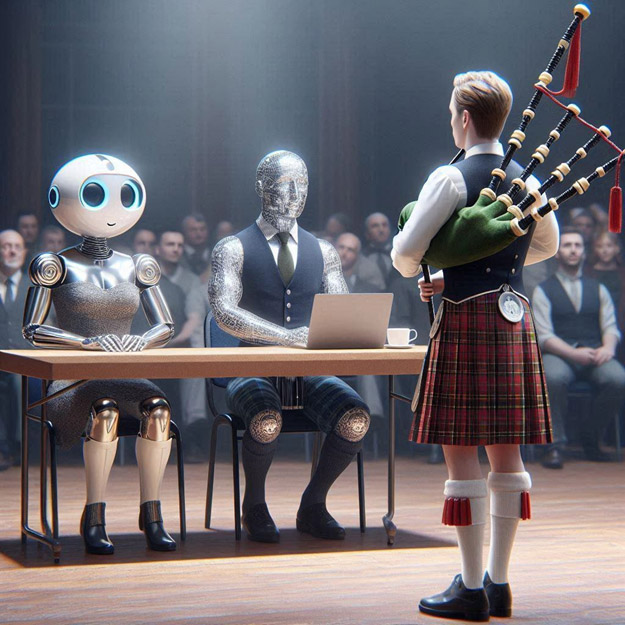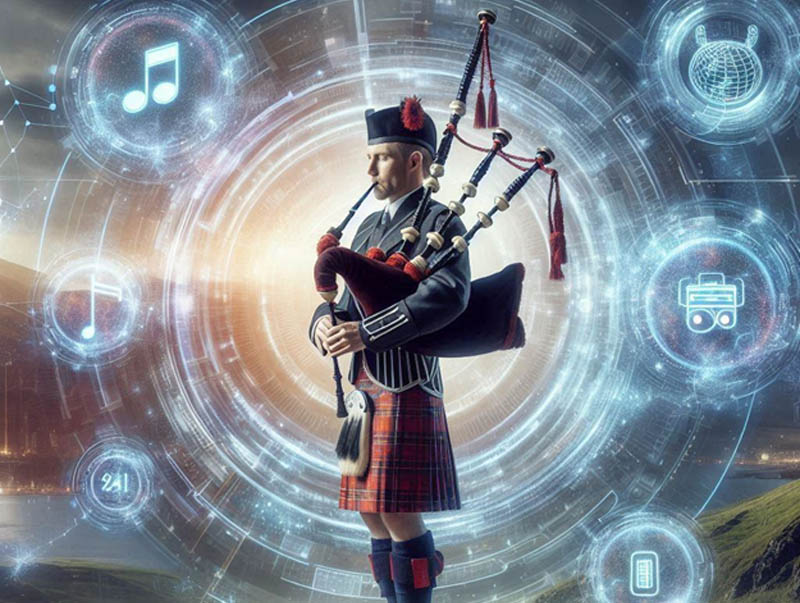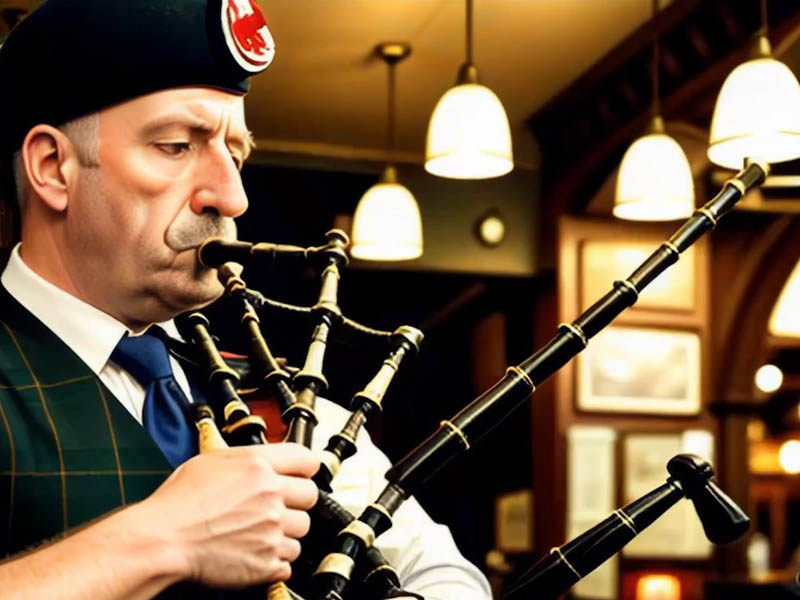The Future of Competitions: harnessing artificial intelligence for objective judging
Artificial intelligence applications can potentially touch virtually every aspect of life as we know it. More than six years ago, pipes|drums saw the potential implication of AI on our competitive craft. We recently featured an application of AI in pipe music composition and even a supporting video. In a series of two articles, piper and computer scientist professional Colin Johnstone looks at two ways in which AI might positively assist in the process of judging our competitions.
In his first article, Johnstone considered the possibilities of AI for expediting the administration of piping and drumming competitions. In his second piece, he looks at how AI might augment or even replace human judges with strictly objective assessments free of the prejudices and biases inherent in adjudication as we know it now.
By Colin Johnstone

We hear of an innovation in artificial intelligence almost every day. AI has made its mark across various fields, from healthcare to finance, and this has led me to think about how we could potentially leverage AI to help with judging competitions.
To make AI judging a reality, a model trained on past competition results and distinct factors that indicate the quality of a performance would be required. While this concept is up for debate, it could potentially streamline the judging process and bring a new level of objectivity to contests.
We would first need to gather extensive data from past competitions to develop AI that can judge bagpipe contests. This data would include audio recordings of performances, results, and score sheets given by judges to examine specific callouts of the performance. By training a machine learning model with all of this data, the AI could begin to recognize patterns and factors that correlate with the top six in contests.
Potential vital elements that the AI would need to learn to identify include:
Tone Quality: The richness and clarity of the sound produced.
Tuning and Pitch: The accuracy of the tuning and the consistency of the pitch throughout the performance.
Rhythm and Timing: The precision of the rhythm and the overall timing.
Expression and Musicality: The ability to convey emotion and adhere to the musical phrasing.
Technical Proficiency: The execution of complex finger movements and embellishments.
By analyzing these performance factors, an AI judge could generate a scoresheet and results that closely resemble those of human judges.
When judging a contest, human judges bring their experiences, preferences, and emotional responses, sometimes leading to varying opinions and biases. AI can provide consistency by looking at historical data and key identifiers of a good performance.
One of the most significant challenges in implementing AI in music and art is the subjective nature of music. When judging a contest, human judges bring their experiences, preferences, and emotional responses, sometimes leading to varying opinions and biases. AI can provide consistency by looking at historical data and key identifiers of a good performance. It may need a more nuanced understanding that a human judge possesses. However, AI could be a reliable tool if trained effectively, offering a fair and consistent evaluation based on data-driven criteria.
Another interesting question is whether it would be easier for AI to judge lower- or professional-grade contests. One might assume lower-grade contests would be easier due to the less complex performances. However, the opposite might be true.
At the same time, more complex and technical professional performances have more distinct quality indicators. The precision, consistency, and musicality are more pronounced, which could make it easier for the AI to detect and evaluate these factors accurately.
In contrast, lower-grade performances might have more variability and less consistency, making it harder for the AI to assess the contest properly. AI would most likely struggle with the nuances of lower-grade contests but could potentially excel at evaluating higher-grade performances, where the good performance indicators are much more apparent.
Integrating AI into judging piping an drumming competitions presents an exciting opportunity as we look to the future. While there are undoubtedly challenges to overcome, the potential benefits are significant. AI could bring a new level of consistency and objectivity to the judging process, ensuring that every performance is evaluated fairly.
Performers would receive precise evaluations that don’t contain personal bias and may even contain notes that a human judge had forgotten to write down.
Also, using AI could provide valuable feedback to performers, highlighting areas for improvement based on data-driven insights. Performers would receive precise evaluations that don’t contain personal bias and may even contain notes that a human judge had forgotten to write down. This allows competitors to focus on honing their skills based on objective criteria.
Overall, using AI to judge contests is challenging and would require a lot of complex work. But with careful development and thoughtful implementation, AI could transform how we evaluate performances, bringing a new era of precision and fairness to the world of bagpipe music. AI has the potential to offer a consistent and objective assessment, enhancing the experience for performers and audiences alike.
What do you think? As always, your thoughts are welcomed via the Comments feature below.
Colin Johnstone is a Professional-grade solo piper based in Aurora, Ontario. He completed his BSc in Computer Science at York University in 2022. After completing a two-year Technology Graduate Rotational Program, he works as a Cyber Security Analyst at the Canadian Imperial Bank of Commerce.




Some interesting points in this article, and I can see how AI might be helpful for some people in some contexts. Personally, I already spend way more time than I’d like interacting with computers. Part of what I enjoy about pipe band is the human element, the subjectivity, the give and take. I’d prefer AI and computers stay as far away from my pipe band experience as possible.
Not a fan of the idea of AI judging a subjective artform.
That fourth drone though. Maybe that’s the pipe organ at the back of the church I’ve heard mentioned.
This article definitely is an interesting topic. I know I might reiterate some of the points already indicated in the op-ed. The misunderstanding some people have is that AI isn’t actually intelligent it can’t differentiate between correct and incorrect but it is very good at using the internet to identify trends to then decide the popular option and spew that option back to you. That being said the factors that it could only really give an objective reading on is things that are quantifiable like tone, tuning, and time. We already have tools that track performances that tell you whether your playing is providing good tuning and time. It tells you exactly where in the recording each offence occurs and how off you are from perfect. These could be used in the judging process. Now, we can quantify tone and technique and use AI to assess the performance however, things like rudiments get altered once a musical interpretation is applied so any amount of rubato is going to apply an infinite amount of variance on deciding weather the rudiment, embellishment is correct. This is where the hole is in my opinion. To properly inform AI it would need data based on past performances and quantify the success of musicality and technique based on what a judge said in the past. In-turn, this is going to impart a bias based on a judges opinion which makes the purpose moot. Then I worry from a growth standpoint, AI would slow down the evolution of musical trends and limit our understanding of “musicality”. Art is ever evolving which is no exception to what we do here.
Human or AI judging will never be perfect. But what about AI improving yourself as a player? When I practice, I often record myself (basic iPhone) and get immediate feedback. But I only hear what I hear.
With an AI program installed on my phone or laptop I could receive Incredible detailed feedback immediately. This may make “teachers” obsolete, but it could make one a better player….